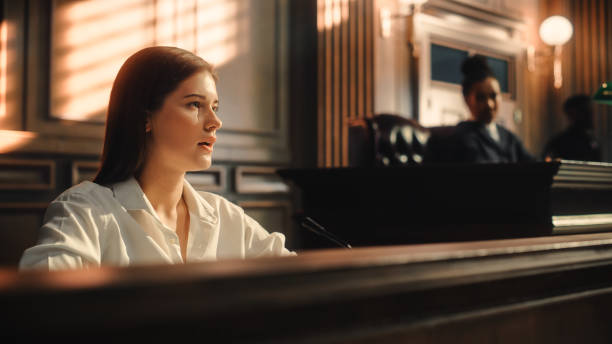Contents
Understanding Expert Witnesses
Expert witnesses are crucial in modern legal proceedings, providing specialized knowledge and insights that can significantly impact case outcomes. These professionals possess expertise in specific fields and offer informed opinions on complex matters that may be beyond the understanding of judges, juries, or attorneys.
Types of Expert Witnesses
Expert witnesses come from various backgrounds and specialties. Some common types include:
- Medical professionals (doctors, surgeons, psychiatrists)
- Engineers and architects
- Financial experts (accountants, economists)
- Forensic specialists
- Technology experts
- Accident reconstruction specialists
Each type brings unique skills and knowledge to legal cases, helping to clarify technical or scientific issues for the court.
The Impact of Expert Testimony
Expert testimony can have a profound effect on legal proceedings in several ways:
Clarifying Complex Issues
One of the primary functions of expert witnesses is to break down complex topics into understandable terms for judges and juries. This helps ensure that important technical or scientific evidence is properly understood and considered.
Establishing Causation
Expert witnesses often help establish causation – the link between an action and its consequences. This is particularly important in personal injury, medical malpractice, and product liability cases.
Assessing Damages
Financial experts often testify about the economic impact of injuries or losses, helping to determine appropriate compensation amounts.
Challenging or Supporting Evidence
Expert witnesses may analyze and interpret evidence, either supporting or challenging its validity and relevance to the case.
The Process of Expert Witness Involvement
Selection and Qualification
Attorneys carefully select expert witnesses based on their qualifications, experience, and ability to communicate complex information effectively. The court must qualify an expert before they can testify, ensuring they have the necessary expertise to provide reliable opinions.
Preparation and Investigation
Once selected, expert witnesses typically:
- Review case materials and relevant evidence
- Conduct independent research or analysis
- Prepare reports detailing their findings and opinions
- Meet with attorneys to discuss their conclusions
Testimony and Cross-Examination
Expert witnesses testify during trials or depositions, explaining their findings and opinions to the court. They must also be prepared to defend their conclusions under cross-examination by opposing counsel.
Challenges and Controversies
While expert witnesses provide valuable insights, their involvement in legal proceedings is not without challenges:
Bias and Credibility
Critics argue that some expert witnesses may be biased towards the side that hired them, potentially compromising their objectivity. Courts and attorneys must carefully evaluate an expert’s credibility and potential conflicts of interest.
Conflicting Opinions
It’s not uncommon for opposing sides to present expert witnesses with conflicting opinions on the same issue. This can create challenges for judges and juries in determining which expert to believe.
Cost Considerations
Hiring expert witnesses can be expensive, potentially limiting access to their testimony for parties with fewer financial resources.
Best Practices for Utilizing Expert Witnesses
To maximize the effectiveness of expert testimony, legal professionals should consider the following best practices:
- Select experts with strong credentials and communication skills
- Thoroughly prepare experts for testimony and cross-examination
- Ensure experts have access to all relevant case information
- Encourage experts to maintain objectivity and avoid advocacy
- Present expert testimony in clear, understandable language
The Future of Expert Testimony
As technology and scientific knowledge continue to advance, the role of expert witnesses is likely to evolve. Some potential developments include:
Increased Specialization
As fields of study become more specialized, we may see a rise in highly focused expert witnesses with niche expertise.
Technology in the Courtroom
Virtual reality, 3D modeling, and other advanced technologies may be increasingly used by expert witnesses to illustrate complex concepts or recreate events.
AI and Data Analysis
Artificial intelligence and big data analysis tools may play a larger role in expert analysis and testimony, potentially offering new insights and challenging traditional expert methodologies.
Ethical Considerations
The use of expert witnesses raises important ethical considerations for the legal system:
Maintaining Objectivity
Experts must strive to maintain objectivity and avoid becoming advocates for the side that hired them.
Transparency
Full disclosure of an expert’s qualifications, methodologies, and potential conflicts of interest is crucial for maintaining the integrity of their testimony.
Access to Justice
Ensuring that all parties have access to qualified expert witnesses, regardless of financial resources, is important for maintaining fairness in the legal system.
Wrapping Up: The Ongoing Importance of Expert Testimony
Expert witnesses play a vital role in modern legal proceedings, bridging the gap between specialized knowledge and the courtroom. Their ability to clarify complex issues, provide informed opinions, and assist in interpreting evidence makes them invaluable assets in many types of cases.
As legal matters become increasingly complex and technical, the need for qualified expert witnesses will likely grow. Attorneys, judges, and juries rely on these professionals to provide medical expert witness services and insights across a wide range of fields, helping to ensure that legal decisions are based on a thorough understanding of all relevant factors.
By carefully selecting, preparing, and utilizing expert witnesses, legal professionals can enhance the quality and fairness of legal proceedings, ultimately contributing to a more just and informed legal system.




